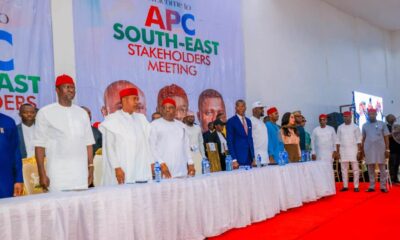GRTech
Ekojara is unveiled; see how to play


- Platform is approved by LSLB
Ekojara game, an online consumer sales promotion platform, owned by Koborise App Technologies Ltd, has been launched.
To play the game, intending player will have to download the application on iTunes iOS store and Android version from Ekojara.com.
Also, the Lagos State Lotteries Board (LSLB) has approved the operations of Koborise App Technologies Ltd., to commence Ekojara gaming activities.
Speaking at the media launch on Monday, October 1, 2018, the Co-Founder/CEO of Ekojara, Mr. Hillary Nwaukor, an auctioneer, disclosed that the game is the Company’s means to add value to millions of Nigerians.
According to Nwaukor, Ekojara is a unique platform that gives users an opportunity to win big value items and cash with minimum risk of 0.20% of the published value; this is a predetermined amount of money that user pays for each ticket they buy.
“For instance, if we publish a cash game of N10,000, each user that want to bid to win the prize will be required to play with 0.20% of N10,000 which is equal to N20 Naira per chance”, he said.
“After downloading app, the user is required to sign-up, then top-up their wallets with minimum of N500 naira before taking a chance to play the advertised games”, he explained.
Also, Ekojara Co-Founder, Olayemi Agbe-Davies, further explained the game categories as ranges from Household Electronics, Smartphones, Recharge Cards, Data Plan, Automobiles and Cash.
“You may notice that we have real estate and automobile listed among the categories. Yes, we are a forward thinking organisation and believe that very soon ‘players’ can win houses as rewards likewise automobiles”.
“Players enter their dream numbers and submit within the odds of 01-99 into 5 unique boxes provided for a given Dream-bid category. Each submitted set of lucky numbers, generate a unique ticket entry. Numbers played can be generated by the players or by the system depending on the option the player wants.
“When the bid time elapses on a game, a draw will be carried out by the randomiser system and one ticket out of the lots of entry will emerge a winner for the advertised item. The draw system is transparent and void of human manipulation. The system is designed to entrench probity and accountability”, he explained.
Meanwhile, Mr. Nwaukor said that the Company is equally positioned to outsource the application to Fast Moving Consumer Goods (FMCGs) Companies in Nigeria and Online Brand Influencers – for general bonanza, giveaways and promotions driven by our innovative lottery application.


Co-Founder of Ekojara, Olayemi Agbe-Davies; Developer, Winner Bolorunduro; co-founders of Ekojara, Hillary Nwaukor and Solution Architect, Kesiena Akpobome, during the media launch of Ekojara on Monday, October 1, 2018 in Lagos
“Our Trademarks and unique gaming application is fully Copyrighted and registered with the Trademarks, Patents and Designs Registry, Commercial Law Department, Federal Ministry Of Industry, Trade and Investment, Abuja”, he said.
Speaking at the event, the General Manager/Chief Executive Officer of LSLB, Mr. Seun Anibaba, confirmed that Koborise has been authorized to commence the online game.
Mr. Anibaba was represented at the media launch by the Head, Legal (Board Secretary/Legal Adviser), Mrs. Adebanke Ogunode, said that the Board maintains strict processes before such platforms are approved as means to ensure transparency and customer satisfaction.
“LSLB holds its licensees to high operational standards in the interest of stakeholders. Before Ekojoara was approved, it was subject to different tests.
“LSLB is notable for adopting a stakeholder inclusive approach in carrying out its regulatory functions. We promote a conducive operating environment for licensees and integrity of games for stakers. Thus, Koborise App Technologies Ltd have now been approved to carry out lottery games online”, the GM/CEO said.
Highlight of the event was a live demo where Ajise Samuel, from Lagos, emerged winner of N20,000 for October 1, 2018; he played with N40.


Co-Founder/CEO of Ekojara, Mr. Hillary Nwaukor, speaking with a winner during a demo session.










